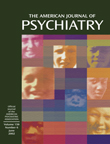Historical, Psychopathological, Neurological, and Neuropsychological Aspects of Deficit Schizophrenia: A Multicenter Study
Abstract
OBJECTIVE: This multicenter study aimed to verify whether the historical and psychopathological characteristics of a large group of patients with deficit schizophrenia were consistent with those reported in previous studies. The authors also tested the hypothesis that neurological and neuropsychological indices sensitive to frontoparietal dysfunction, but not those sensitive to temporal lobe dysfunction, are more impaired in patients with deficit schizophrenia than in those with nondeficit schizophrenia. METHOD: For each patient with deficit schizophrenia enrolled in the study, a matched subject with nondeficit schizophrenia was recruited. Historical, psychopathological, neurological, and neuropsychological evaluations were carried out for all patients. RESULTS: Patients with deficit schizophrenia, compared with patients with nondeficit schizophrenia, had a similar severity of positive symptoms and disorganization and less hostility. They had poorer premorbid adjustment during childhood and early adolescence and exhibited more impairment in general cognitive abilities. The deficit state was associated with impairment in sequencing of complex motor acts, which suggests frontoparietal dysfunction. CONCLUSIONS: Previous reports of differences in historical, psychopathological, and neuropsychological characteristics between patients with deficit schizophrenia and those with nondeficit schizophrenia were mostly supported by the present findings. Neurological findings suggest that frontoparietal functioning is more impaired in patients with deficit schizophrenia. Deficit schizophrenia might represent a neurodevelopmental subtype of schizophrenia in which significant behavioral and cognitive impairment since childhood compromises the development of basic capacities relevant to subsequent cognitive and social functioning.



